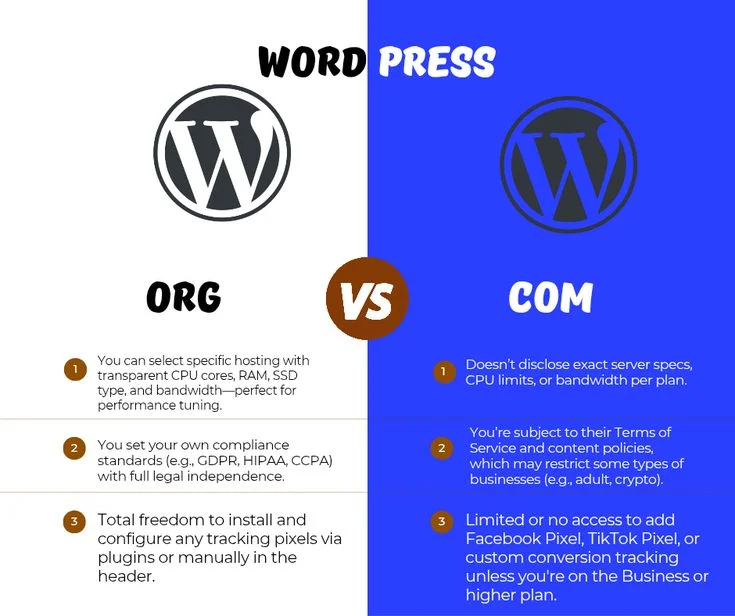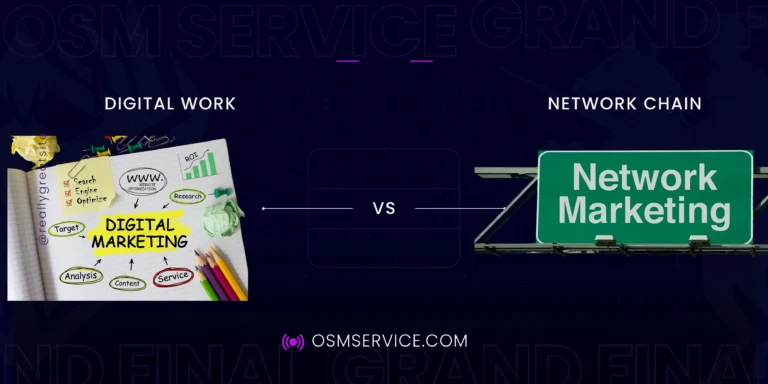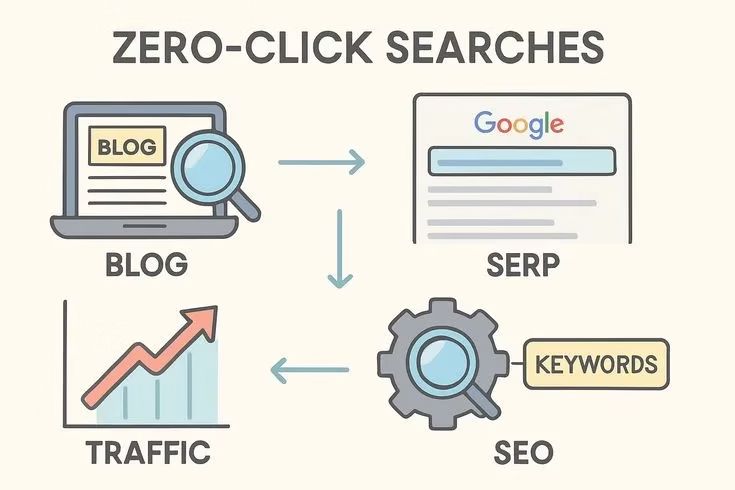WordPress.com vs WordPress.org: What’s the Difference & Which One Should You Choose?
WordPress.com vs WordPress.org: A Complete Comparison Guide (2025)
If you’re planning to create a website or blog, chances are you’ve come across WordPress. But soon enough, you’ll face this confusing question: Should I use WordPress.com or WordPress.org?
While both platforms are built on the same WordPress software, they’re quite different in terms of features, flexibility, and who they’re best suited for.
In this article, we’ll break down the key differences between WordPress.com and WordPress.org so you can decide which one fits your needs best.

What Is WordPress.com?
WordPress.com is a fully hosted platform managed by Automattic — the company behind WordPress. It allows you to create a website without worrying about hosting, security, updates, or technical tasks.
It’s ideal for beginners, personal bloggers, and users who want to launch a website without any coding or setup. The platform handles everything for you — from server management to automatic backups.
Key Features of WordPress.com
- Free subdomain: yourname.wordpress.com
- Hosting, security, and maintenance included
- Access to basic themes and design tools
- Paid plans for advanced features, custom domain, and monetization
- Limited plugin access unless on Business or Pro plan
However, if you’re on the free or lower-tier plans, you can’t install third-party plugins or use custom themes. This makes customization and advanced functionality difficult without upgrading.
What Is WordPress.org?
WordPress.org is the self-hosted version of WordPress. It gives you complete freedom and control over your website. You download the WordPress software (which is free) from WordPress.org and install it on a web host of your choice (e.g., Bluehost, Hostinger, SiteGround).
With WordPress.org, you can build any kind of site — blogs, portfolios, eCommerce stores, membership sites, and even forums — all with full access to themes, plugins, and your site’s code.
Key Features of WordPress.org
- Use any custom domain name
- Install any free or premium plugin
- Full theme customization and access to theme builders
- Monetize however you want (ads, affiliate marketing, WooCommerce)
- Own 100% of your site and its data
However, with great power comes great responsibility — you’ll need to manage your own hosting, updates, backups, and security.
WordPress.com vs WordPress.org: Feature-by-Feature Comparison
Here’s a detailed comparison table of WordPress.com vs WordPress.org:
| Feature | WordPress.com | WordPress.org |
|---|---|---|
| Hosting | Included in all plans | Self-hosted (you choose and manage) |
| Domain Name | Free subdomain or custom (paid) | You choose any domain name |
| Customization | Limited unless on Business+ plan | Unlimited — themes, plugins, code |
| Plugins | Only on Business+ plans | Unlimited plugin access |
| Themes | Limited selection | Thousands of free & premium themes |
| Monetization | Limited; only on paid plans | Full freedom (ads, affiliate, etc.) |
| eCommerce | Only on high-tier plan | Full support via WooCommerce |
| Maintenance | Handled by WordPress.com | You manage everything |
| Support | Email/live chat (paid plans) | Community + hosting provider |
| Cost | Free basic, paid for features | Free core, hosting & domain required |
| Ownership | Partial control by WordPress.com | You own everything (100% control) |
Pros and Cons of WordPress.com
Pros
- No need to buy hosting separately
- Automatic backups and updates
- Beginner-friendly dashboard
- Free plan available for testing
Cons
- Limited design flexibility
- Restricted plugin usage
- Limited monetization options
- Ads on free plans (you can’t remove them)
Pros and Cons of WordPress.org
Pros
- Complete freedom and control
- Full access to themes and plugins
- Better for SEO and speed optimization
- Ideal for business, eCommerce, or advanced sites
Cons
- Requires separate hosting and domain purchase
- More technical responsibility
- Must manage your own backups and security
Use Cases: Which One Should You Choose?
Choose WordPress.com if:
- You’re a beginner or casual blogger
- You want a simple site without technical management
- You don’t need advanced features or monetization
- You prefer a “set it and forget it” platform
Choose WordPress.org if:
- You’re serious about growing your website or business
- You want to install plugins like SEO tools, contact forms, analytics, etc.
- You plan to monetize your site with ads, products, or memberships
- You want total control over every part of your website
WordPress.com vs WordPress.org for eCommerce
If you’re planning to build an online store, WordPress.org is the better option. It gives you full control over WooCommerce, product management, payment gateways, custom checkouts, and more.
WordPress.com, on the other hand, only supports eCommerce features on its highest-tier plan (eCommerce or Pro), which can be quite expensive. Plus, you won’t have the same flexibility for customizing your store’s design and functionality.
SEO Comparison: WordPress.com vs WordPress.org
When it comes to SEO, WordPress.org wins hands down. With full access to SEO plugins like Yoast SEO, Rank Math, and custom coding, you can optimize every aspect of your site — from URLs to meta tags to schema markup.
While WordPress.com does offer basic SEO tools on premium plans, it doesn’t match the depth of control and optimization available with WordPress.org.
FAQs About WordPress.com vs WordPress.org
1. Can I switch from WordPress.com to WordPress.org later?
Yes, you can migrate your content from WordPress.com to WordPress.org. There are tools and plugins that make the transition smoother. However, some manual work might be required for settings, theme customization, and plugins.
2. Is WordPress.org free?
Yes, the WordPress.org software is 100% free. But you’ll need to pay for web hosting (₹200-₹500/month) and a domain name (₹800/year).
3. Can I earn money with WordPress.com?
Only on paid plans. WordPress.com limits monetization on free plans. You need a Business or eCommerce plan to run ads, install affiliate plugins, or use payment gateways.
4. Which is better for blogging?
For personal blogging, WordPress.com is simpler. But for professional blogging with monetization, SEO tools, and advanced customization, WordPress.org is far more powerful.
5. Is WordPress.org harder to use?
It has a slight learning curve, especially if you’re new. But with the right hosting provider and a bit of guidance, it’s easy to manage and incredibly powerful.
Conclusion: Which One Should You Choose?
Choosing between WordPress.com vs WordPress.org depends on your goals, experience level, and how much control you want over your website.
If you’re looking for simplicity, low maintenance, and don’t need many customizations, WordPress.com is a great place to start. But if you’re serious about your website, need advanced features, or plan to grow your online presence or business, then WordPress.org is the better long-term investment.
Ultimately, both platforms serve different needs. Make your decision based on the features that matter most to you — whether it’s ease of use or full control and flexibility.
👉 Want help setting up WordPress.org?
Let us help you install WordPress, configure your plugins, and secure your site — visit osmservice.com to get started!






